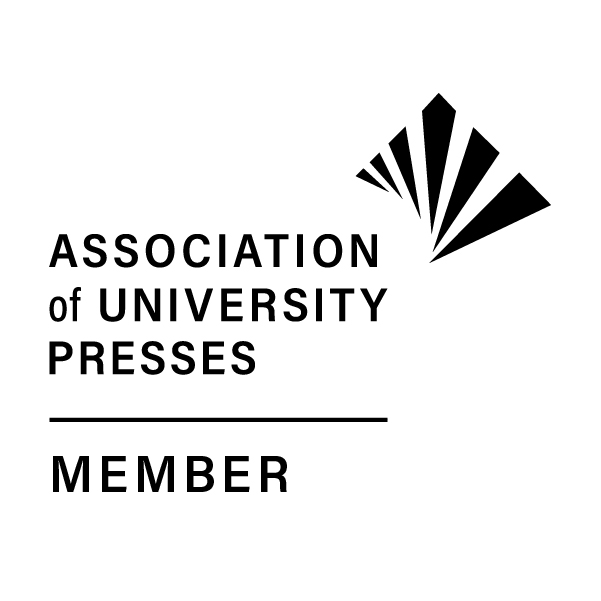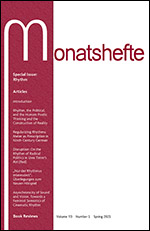|


|

Subscribe
Read the Journal Online
Submission Guidelines
Editorial Board
Receive Email Updates
Advertise in Monatshefte
Indexes/Abstracts
Current Issue TOC
Back Issues TOC
Monatshefte 2022 Subscription Rates
Institutions:
print & online $271
online only $233
Individuals:
print & online $103
online only $86
Non U.S. Postage (no postage charges for online-only subscriptions)
Airmail: add $40/yr.
Canadian Subscribers: add 5% GST. |
Monatshefte
Volume 111, Number 3, Fall 2019
Table of Contents
Special Issue: Rache und Sprache
ARTICLES
Juliane Prade-Weiss and Jens Klenner
Rache und Sprache. Einleitung
Mona Körte
Die Rache roher Texte. Treue zum Unsinn in den Kinder- und Hausmärchen Jacob und Wilhelm Grimms
This essay focuses on two different but nonetheless interdependent phenomena: nonsense and revenge as hitherto underappreciated aspects of the original context of the Kinder- und Hausmärchen. In Jacob Grimm’s “Sammelaufruf zur Mitarbeit” of 1811, nonsense as creative surplus serves as an explicit reminder of the oral tradition. Nonsense in this form, however, is unrelated to the artistic nonsense found in German Romantic Kunstmärchen. In the Kinder- und Hausmärchen, revenge is an implicit and nonsense-utilizing strategy that acts on various levels: on the meta-level, nonsense serves as a vehicle for revenge directed at the displacement of the oral by the written form, as revealed in the earliest version of the Kinder- und Hausmärchen (1810). Closer analysis of the cumulative-tale genre further reveals that revenge finds expression in the combination of the chain-narrative form and linguistic repetition, which in turn supplants reason and sense with escalation and excess. (MK; in German)
Erica Weitzman
Despite Language: Adalbert Stifter’s Revenge Fantasies
Adalbert Stifter’s short story “Turmalin,” from the collection Bunte Steine, centers on a failed act of revenge. Having been cuckolded by his wife with the actor Dall, the victim—known in the story only as the “Rentherr”—suffers a second blow when his plan of retaliation falls flat, sending him into a wounded retreat from society. And yet in this retreat, a displaced or proxy revenge is effected, in the form of the physical, mental, and linguistic stunting of the Rentherr’s young daughter. This article examines the well-known linguistic deformation of the girl at the center of Stifter’s story in terms of its both analogical and causal relationship with the Rentherr’s miscarried efforts at requital. Building on heretofore overlooked textual evidence, the article further argues that Stifter’s story constitutes an attempted revenge on the uncertain fidelity and rationality of language itself, in which not merely the adequacy of representation, but the very substance of thought and the idea of human reason is at stake. (EW)
Juliane Prade-Weiss
Die Rache und ihr Surrogat. Zur Erwiderungslogik bei Freud
In Studies on Hysteria, Freud assumes that in the case of an insult, psychological health is maintained by way of “an adequate reaction—as, for instance, revenge. But language serves as a substitute for action” (SE2, 7). In many of Freud’s writings, revenge serves as an ideal model for reciprocity that is given priority over speech. Yet a complication keeps occurring: in loss and mourning, no counterpart can be hurt by revenging acts or words. In the course of Freud’s articulation of psychoanalytic theory, revenge is evoked as a model for reciprocity exactly when suffering (and therapy) is caused by the loss, or absence of the other who could respond. Psychoanalysis deals mostly with the alleged surrogate for revenge, with forms of speech such as lamentations and complaints emphasizing that speech is not only by someone and on something, but also addressed to someone. (JPW; in German)
Tobias Heinrich
Rache als Narrativ des Terrors. Kleists Michael Kohlhaas und die Logik der Gewalt
In his response to the attacks of 09/11, Baudrillard underlines that terrorism, erratic though it may seem, follows a logic of symbolic exchange. Terrorism, according to Baudrillard, is concerned with restoring the balance of good and evil renounced by Enlightenment thought. Narratives of revenge and retaliation serve as legitimations for acts of terror and amok. They thus evoke an affectively regulated sense of justice and voice a pre- or extra-juridical discourse. Such narratives negotiate constructions of violence, masculinity, and autonomy according to a logic of exchange. In this context, Kleist’s Michael Kohlhaas remains timeless, particularly in its attention to the discursive framing of the feud campaign. Reading Kleist’s text in view of current discourses on terrorism and amok reveals that the narrative pattern of revenge not only serves to legitimize acts of violence but also contributes essentially to constituting the very phenomena of terror and amok. (TH; in German)
REVIEW ARTICLE
Marcus Bullock
A Divisive End to the World—New Contexts for Walter Benjamin on Myth, Violence, Theology, and Modernity in Berlin
(Styfhals, Willem, No Spiritual Investment in the World: Gnosticism and Postwar German Philosophy, 2019.—Dickinson, Colby and Stéphane Symons, eds., Walter Benjamin and Theology, 2016.—Ebert, Sophia, Walter Benjamin und Wilhelm Speyer, 2018.)
BOOK REVIEWS
Adelson, Leslie A., Cosmic Miniatures and the Future Sense: Alexander Kluge’s 21st-Century Literary Experiments in German Culture and Narrative Form (Martin Brady)
Amslinger, Julia, Eine neue Form von Akademie. Poetik und Hermeneutik – die Anfänge (Carsten Dutt)
Boden, Petra und Rüdiger Zill, Hrsg., Poetik und Hermeneutik im Rückblick. Interviews mit Beteiligten (Carsten Dutt)
Bruce, Iris and Mark H. Gelber, eds. Kafka after Kafka: Dialogical Engagement with His Works from the Holocaust to Postmodernism (Marcus Bullock)
Fohrmann, Jürgen, Feindschaft / Kultur (Michael McGillen)
Gellen, Kata, Kafka and Noise: The Discovery of Cinematic Sound in Literary Modernism (Rolf J. Goebel)
Gerhardt, Christina, Screening the Red Army Faction: Historical and Cultural Memory (Sonja E. Klocke)
Gezen, Ela E., Brecht, Turkish Theater, and Turkish-German Literature: Reception, Adaptation, and Innovation after 1960 (Rob Burns)
Martínez, Matías, Hrsg., Erzählen. Ein interdisziplinäres Handbuch (Thomas P. Scholz)
Matthews, Alastair, The Medieval German Lohengrin: Narrative Poetics in the Story of the Swan Knight (Christopher R. Clason)
Otto, Norbert, Julian Schmidt. Eine Spurensuche (Jeffrey L. Sammons)
Simon, Ralf, Hrsg., Grundthemen der Literaturwissenschaft: Poetik und Poetizität (Vincenz Pieper)
Spoerhase, Carlos, Das Format der Literatur. Praktiken materieller Textualität zwischen 1740 und 1830 (Peter Krapp)
Thiher, Allen, Understanding Franz Kafka (Marjorie Rhine)
Thompson, Mark Christian, Kafka’s Blues: Figurations of Racial Blackness in the Construction of an Aesthetic (Marilyn Sephocle)
Trabant, Jürgen, Hrsg., Wilhelm von Humboldt. Sprache, Dichtung und Geschichte (Marko Pajević)
Tymkiw, Michael, Nazi Exhibition Design and Modernism (Justin Court)
Weiershausen, Romana, Zeitenwandel als Familiendrama. Genre und Politik im deutschsprachigen Theater des 18. Jahrhunderts (Gail K. Hart)
|

